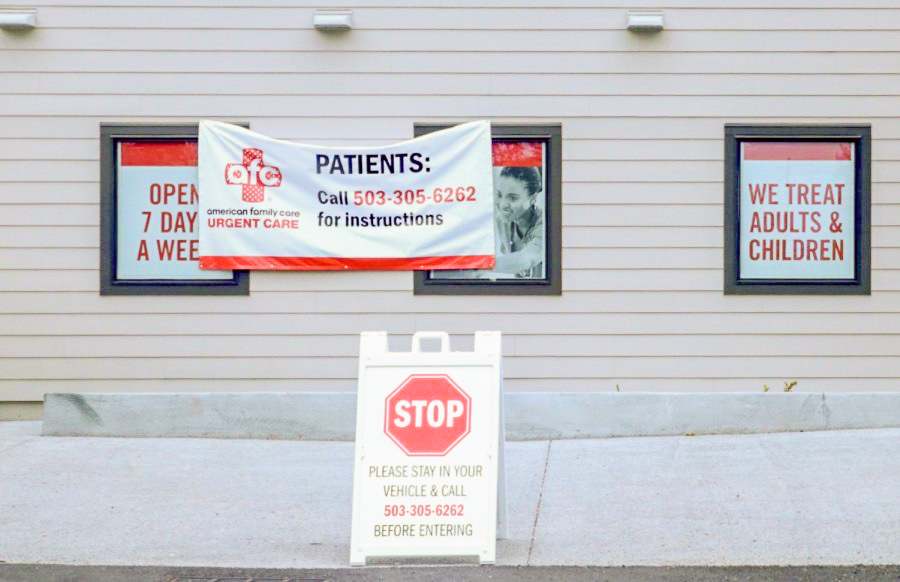Editorial: This Is Not a “Coronacation” — Quarantine Is Not Over Yet
An urgent care center in Oregon City displays signs warning visitors to take necessary social distancing precautions.
April 29, 2020
Quarantine is not a celebration. It is not a chance to hang out with your friends. It is not a break from your classes. It is not a “coronacation.”
We are not even close to the finish line at the end of quarantine. Yet despite the warnings, people are still continuing to hang out with others from outside of their households while ignoring social distancing measures completely.
It has been six weeks since La Salle announced the initial switch to digital learning days (DLDs) due to COVID-19. When this was first announced on March 12, students and staff were only expecting to be away from campus for a total of three weeks, including spring break.
But soon after, the weeks of digital learning days extended, and now they are the plan for the rest of the school year.
Despite the closing of La Salle’s campus to encourage students to stay home, social media feeds are still being flooded with people disregarding the need to quarantine. By leaving their houses for unnecessary essentials or endeavors such as going to the beach or meeting up with groups of friends, many teens are continuing to be careless, immature, and selfish.
It is time to take this pandemic seriously.
These are unprecedented times, and the world right now is extremely stressful for many people and their families. This makes it crucial that we are empathetic towards others during this time, which includes taking into account how our own actions might affect others.
We are all at risk of contracting COVID-19, but some are more vulnerable than others, such as those who are immunocompromised or elderly. People with asthma, chronic lung disease, diabetes, serious heart conditions, liver disease, and many more are at high risk of infection, and are likely to experience more severe consequences if they do contract the virus.
Even if we are not personally among the millions of people in one of these high-risk groups, when we ignore the social distancing guidelines we create chains of transmission that allow the virus to reach those who are vulnerable.
And because we don’t know everything about this virus, going out for unnecessary purposes is not worth the risk, whether you believe you have contracted it or not. Those who are without symptoms can also be carriers of the virus, as research suggests that 25% of those infected are asymptomatic. These people may seem healthy but are actually carriers of the virus, which only increases the risk of spreading COVID-19 in public.
We all have a role in preventing the spread of the coronavirus: social distancing and self-isolation. Even if we feel healthy, we must remain isolated to protect not only ourselves but others as well.
Hundreds of people are protesting against social distancing guidelines in places like Redmond, continuing to shake hands, hug one another, and pass an unsanitized microphone around while neglecting to wear protective face masks. Throughout these demonstrations, the coronavirus is continuing to spread.
When groups of friends hang out but do not keep sufficient distance between each other, the same thing occurs.
The spread of the virus has a domino effect, in a sense. If you decide to have a small gathering with a few friends, and one of them is an asymptomatic carrier of the coronavirus, you might bring the virus home but are yet to show symptoms. Then, if you or a family member go to work in the next few days, the virus could spread to those nearby. After that, the cycle repeats itself, and what originally seemed like a harmless meetup has now turned into making what is already a global pandemic even worse.
Every individual that you have been near could spread the virus to those in their own homes, contributing to the cycle. Or, the virus might spread to a parent who is an essential worker, and similar consequences could end up happening at their workplace.
We cannot ignore social distancing simply because we miss our friends, or are tired of being inside. As difficult as it might be to remain isolated for extended periods of time, our actions influence others both directly and indirectly.
In the United States, the number of confirmed COVID-19 cases has exceeded 1 million, and the number of deaths is now over 60,000. The rise in cases in the future depends on not only whether a cure is found or a vaccination is created, but on how much Americans distance themselves from one another in the meantime.
Social distancing is vital, as is our ability and willingness to understand the possible transmission routes for the virus.
When someone coughs heavily, they release about a quarter-teaspoon of fluid that quickly disperses droplets through the air that can last up to 20 minutes and can fill a room of about 600 square feet. Throughout that time, the droplets can linger in the air or land on different surfaces.
It’s also important to recognize that there are other ways for the virus to spread besides coughing and sneezing. In fact, people with mild or even no symptoms at all could spread COVID-19 through simple actions such as speaking or breathing around others.
Because of these contagion factors, the Centers for Disease Control and Prevention (CDC) directs us to keep at least six feet away from others so that we don’t come into contact with the droplets traveling through the air.
With this six-foot distance guideline from the CDC, some people take it as a green light to continue to meet up with others but to just try to stay six feet apart. However, small droplets known as aerosols can travel even farther than six feet.
Research from Massachusetts Institute of Technology (MIT) has observed that particles from a cough can travel up to 16 feet, and particles from a sneeze can travel up to 26 feet.
Instead of risking spreading the coronavirus for unnecessary events, it is crucial that people only leave the house when absolutely necessary.
Staying home saves lives. We need to respect the safety of the frontline workers, families, and friends who are all struggling due to COVID-19.
It is understandable that social distancing can be quite difficult because we’re supposed to stay home as much as possible, and we are not supposed to spend time with people who we usually get to see on a regular basis.
However, even though it may not seem like a big deal to visit with your friends, especially those who are asymptomatic or have been quarantining for an extended period of time, it still contributes to the spread of COVID-19. Everyone misses their friends and extended family, but it is crucial that we hold off from coming in contact with them until the virus has disappeared. Even if you and your friends seem healthy, that doesn’t mean you are out of harm’s way.
Social interaction is important for our everyday lives, but we can ensure that we stay in touch through other resources, especially with the technology we have today. Video chatting with Houseparty, Zoom, or group FaceTime allows you to keep in touch with others while staying safe. You can also always send a loved one a text or call just to say ‘hi’ or check in.
For the sake of everyone in our community, we all need to be living in isolation for the time being, despite the urge to visit our friends and family outside of our homes. While many people have the privilege to work safely from home, others are essential workers and are still coming in contact with others at their workplace.
Essential workers range from doctors and paramedics to grocery clerks and sanitation workers, but each individual who continues to work during this time is placing themselves at some risk simply by being vulnerable to the public.
It’s important to realize that ignoring social distancing not only puts yourself and essential workers at risk, but also everyone else who has had contact with you or with the essential workers that you are potentially infecting by hanging out with friends. Practicing caution for the good of essential workers also benefits the families that they go home to because of the domino effect.
The ability to work from home or stay safely quarantined is a privilege. La Salle was gifted with the ability to change to digital learning days so quickly and efficiently, and disregarding this privilege is insensitive to those who do not have it.
Granted, it is necessary for people to buy groceries and other products. There are stores that are offering deliveries or curbside pickup, but there are still waves of shoppers venturing out on a daily basis.
Stores are taking measures to help protect workers and shoppers from the coronavirus, whether it be providing masks and gloves or limiting capacity. Despite these measures, dozens of grocery store workers have still died from the virus, including one who worked at a Portland Whole Foods.
Many people are doing their part to slow the spread of the virus, but even when it is necessary to go outside, there are lots of people who aren’t properly keeping their distance. We need to make sure we stay home whenever we can, and also practice distancing the correct way as much as possible when we do go out for necessities.
If people stay home, we will be able to return to our normal daily lives at a much faster rate than if we continue to ignore social distancing. For instance, it is likely that more than 70,000 cases of the coronavirus have been avoided in Oregon because of social distancing. The more responsibility we take to slow the spread of the virus, the sooner we get to enjoy the things we are missing, like school, sports, and being together.
It is better to utilize technology and other resources to remain isolated than to risk accidentally contributing to the spreading pandemic for the sake of hanging out with friends. We are all living through this pandemic together, and so together we must work towards changing the outcome.






Hannah Reddick • Apr 29, 2020 at 11:59 pm
This article is so important and I’m glad the awesome Falconer team brought this up! It’s been heartbreaking to see my immunocompromised loved ones and friends being forced to put in extra effort because of others’ irresponsible actions, and to see people I know and care about breaking social distancing rules in ways that could put many people in real danger. As tough as it is to be so far away from my friends and extended family, we all need to take responsibility by giving up small personal freedoms to save lives.
One thing I’ve been doing to stay in touch with my grandparents is driveway picnics. We meet up in one of our driveways and bring snacks and lawn chairs. Then we sit at a save distance from each other and catch up. It’s an awesome way to see loved ones’ faces in person and be in each other’s presence, even if we still can’t hug each other or be physically close to one another. I definitely recommend it 🙂